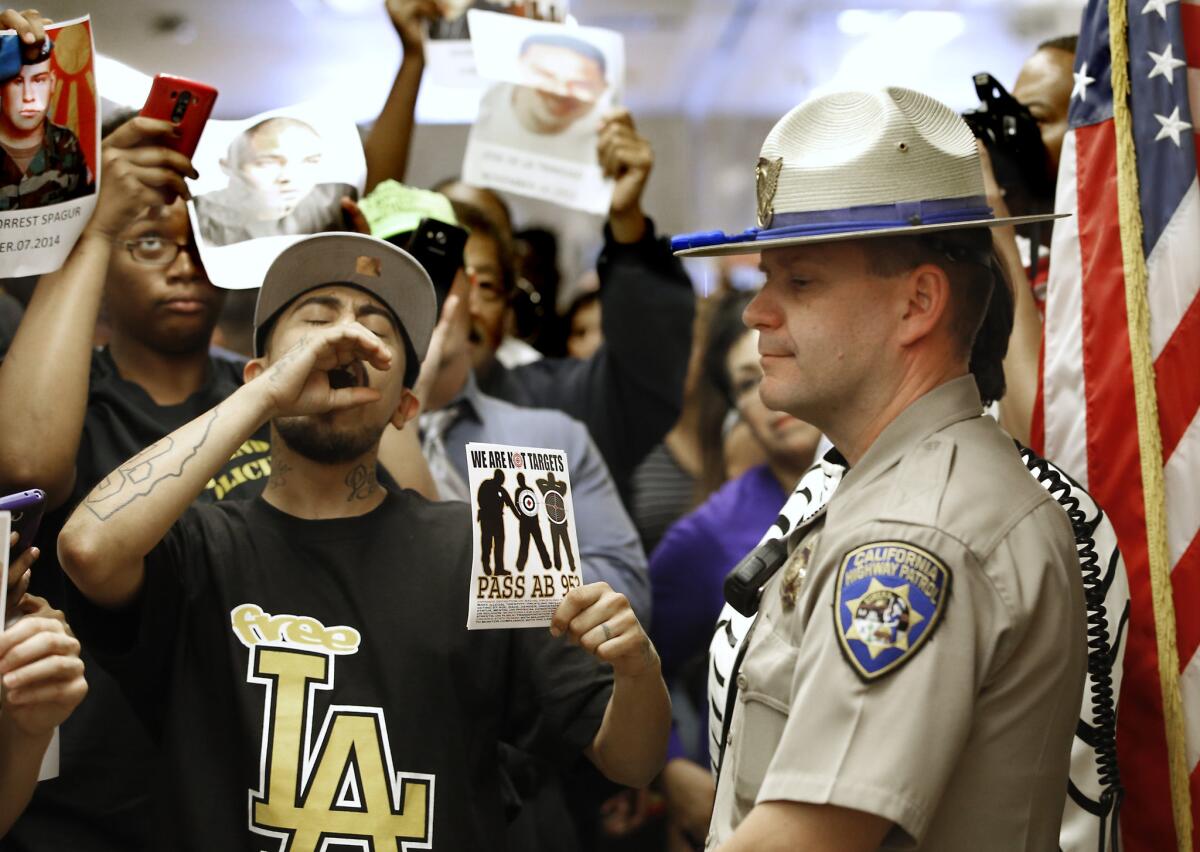Racial profiling bill draws praise from activists, criticism from police

A California Highway Patrol officer stands outside the office of Gov. Brown last month as protesters shouting “black lives matter” demand passage of racial profiling legislation.
- Share via
Reporting from Sacramento — The decision by Gov. Jerry Brown to approve a new data collection requirement to identify and eliminate racial profiling was hailed by civil rights activists Saturday, but law enforcement officials questioned the value of such reporting.
The bill requires agencies to collect data on every stop of a civilian, including their perceived ethnicity, the reason for the stop and the outcome (whether an arrest is made).
A report by the American Civil Liberties Union said California holds the record for the highest number of deaths at the hands of law enforcement in the country, with 149 people killed in the state this year.
The photographs of many of those killed have been on display outside the governor’s Capitol office, where demonstrators had been holding a vigil and urging the governor to sign the bill.
Those attending the vigil included the Rev. Ben McBride, director of Regional Clergy Development with the civil rights group PICO California.
“As people of faith, we were compelled to pray for Governor Brown’s moral courage to sign AB 953 and take a step to end the suffering of black, brown, and indigenous communities that are traumatized by racial profiling and overly aggressive policing practices,” McBride said Saturday. “This precedent setting legislation is historic – it is both a moral and legal victory for our state and our nation.”
The governor’s approval of the racial profiling bill was “disappointing” to David Bejarano, president of the California Police Chiefs Assn., which had concerns about the cost and burden of collecting so much data.
“There is no proven information that this reduces or prevents racial profiling. It’s a huge amount of data collected without any consequence,” said, Bejarano, chief of the Chula Vista Police Department.
SIGN UP for the free Essential Politics newsletter >>
The chiefs, they said, want to eliminate racial profiling but believe departments are taking steps to make that happen.
Amador County Sheriff Martin Ryan said the governor called him Saturday and they talked for half an hour about why he was signing the bill. The governor felt something needed to be done, said Ryan, president of the California State Sheriffs Assn.
“Frankly, it’s disappointing,” Ryan said. He said counties and cities face a costly process of gathering data that will lack context because, for instance, it will not say whether a stop is made in an area with a large minority population.
“It seems to me to be an emotional response to collect information to help them reach a conclusion that they have already reached,” Ryan said of the bill’s backers.
The measure does not require the data to begin being collected until March 1, 2018, to allow the state and law enforcement agencies time to put together the collection system.
MORE FROM STATE POLITICS
California’s toxics enforcer is given sharper teeth
California law seeks history of Mexican deportations in textbooks
How race helped shape the politics of Senate candidate Kamala Harris
More to Read
Sign up for Essential California
The most important California stories and recommendations in your inbox every morning.
You may occasionally receive promotional content from the Los Angeles Times.











